Celebrating the Joyful Learning Community of West Chester Friends School
Prepare the Child for the Road, Not the Road for the Child, by John Scardina, School Psychologist
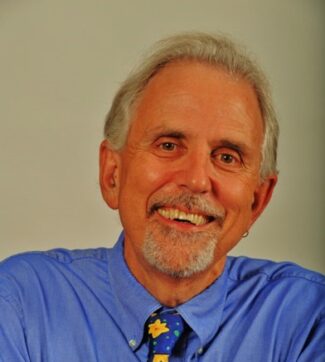 When I was growing up, if there was a problem at school, the consequences at home would far outweigh the consequences in school. My parents believed in accountability, and they never would have dreamed of disputing the word of a teacher.
When I was growing up, if there was a problem at school, the consequences at home would far outweigh the consequences in school. My parents believed in accountability, and they never would have dreamed of disputing the word of a teacher.
While there can certainly be times when school personnel are wrong – operating out of their own biases – in general we educators work with hundreds of children, and our perspective on behavior has been tested on many more individuals than live in your home. Yet, in recent years, parents choose to question the school around discipline issues and clear the way for their children to avoid consequences. Sometimes this allows our children to think that others will take care of any consequences.
In their book The Coddling of the American Mind, Greg Lukianoff and Jonathan Haidt suggest that there have been three great “untruths” perpetuated by the current Boomer generation: that adversity leads to fragility rather than resiliency; that emotional beliefs are always true; that some people are “good” and some people are “bad” (often referred to as the “false binary”).
We now have “snowplow parents” outdoing the “helicopter parents” of yesterday, clearing the road ahead of all obstacles so Johnny can glide through life hassle free. We also validate our beliefs based upon the strength of our feelings rather than the examination of those beliefs by our intellect: it must be “right” if it feels “right” to us. Finally, we say that “good people cannot be racist” and “bad people have nothing offer” rather than look at the common humanity and fallibility of all people.
As Scott Peck said in the opening line of The Road Less Travelled, “Life is difficult.” Wisdom – deep learning that shapes our character – comes at a cost, and that cost often involves discomfort, suffering, and loss. Nobody wants to see their child hurting, but hurting is a necessary part of growing up. The true gift of a skinned knee or a loss of electronics for a week or a need for restitution for property lost or broken is the lesson learned: nothing comes for free.
I am a firm believer in “tough love”: high affection, high awareness, and high involvement parenting that allows for appropriate exploration and pain as part of growing up. We have heard of recent college graduates who show up at their new jobs expecting everything to be easy and nurturing: employers scratch their heads and wonder what has happened to maturity and responsibility.
Let your children fall down and fail and make mistakes. Provide the opportunity for them to make amends and learn from their experiences. Allow them the gift of pain when they need to suffer a bit. In the end they will be ready for the road ahead and not be waiting for the world to take care of them.
QLT Plastic Recycling Underway!
Members of the Quaker Leadershp Team coordinated the collection of plastic recyclables that will be repurposed into a beautiful bench for our elder friends at The Hickman Friends Senior Community of West Chester! Thanks QLT, WCFS community , Teacher Nancy, Teacher Amy and our friends Teacher John and Teacher Randall for your wonderful work on this great project! 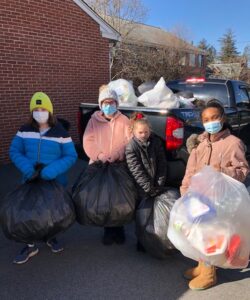
Sparking the Imagination in Pre-Kindergarten
The Pre-K students sat quietly while their teacher drew this picture. “What is it?” she asked. After listing their answers, she aske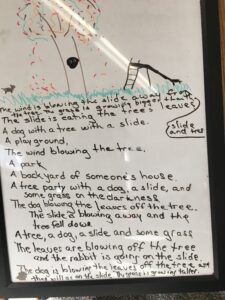 d, “Who is right?” The children first answered “me!” or named a friend, but then began to say, “All of us!” and “Everyone!” Exactly! At WCFS, we use this kind of simple activity to encourage students to stretch their imaginations, understand different perspectives, build a story, expand their descriptions, grow vocabulary, identify letter sounds when writing, and lots more! What do you see?
d, “Who is right?” The children first answered “me!” or named a friend, but then began to say, “All of us!” and “Everyone!” Exactly! At WCFS, we use this kind of simple activity to encourage students to stretch their imaginations, understand different perspectives, build a story, expand their descriptions, grow vocabulary, identify letter sounds when writing, and lots more! What do you see?
Talking to Children About Politicl Events: Love Over Fear by School Psychologist John Scardina
Talking to Children About Political Events: Love Over Fear
by John Scardina, WCFS School Psychologist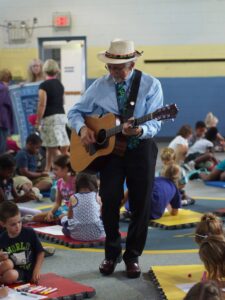
This has been an eventful new year thus far, and many of us have had to sort out for ourselves how we process what we witness in our country.
Our children also will have questions – even if they do not seem to notice present current events. Here are some quick guidelines:
- Make sure you are calm and have time for a chat – no need to get anyone else upset if we are not ready to talk!
- Pick a good time and place – sitting down, maybe sharing a snack, all electronics turned off…
- Ask your child what they know already – it’s good to start from their knowledge base. If they know nothing, take a moment and think if you want to proceed at that time…
- Answer any questions and clear up any factual confusion as best you can. Try to stick to “directly observable data” (as my graduate school professor drilled into me!) and avoid judgment.
- Assure them – if they are upset – that you and your family are safe and can hope to remain safe. Choose to embody love rather than fear.
- Remind them that we are a nation of laws and that our political system has checks and balances to allow for peaceful transitions when there is turmoil.
- Avoid inflammatory comments and blame – people have been acting on their own belief systems, and at the very least we can honor the integrity of those with whom we disagree.
- Let them know that you are always available to talk.
Sometimes it’s also good to remind our children – and ourselves – what it means to be good citizens in out homes, our communities, and our nation. I have often turned to Robert Fulghum’s book, All I Really Need to Know I Learned in Kindergarten. Here are some of his suggestions for “the right was to behave”:
- Share everything.
- Be aware of wonder.
- Play fair.
- Don’t hit people.
- Put things back where you found them.
- Clean up your own mess.
- Don’t take things that aren’t yours.
- Say you’re sorry when you hurt someone.
- Wash your hands before you eat.
- Take a nap every afternoon.
- Live a balanced life: learn some and think some and draw and paint and sing and dance and play and work every day.
As always, I leave you with this choice: we can raise our children to be fearful of life or we can raise our children with the loving awareness that each of us can help to build a better world.
###
Celebrating May Day!
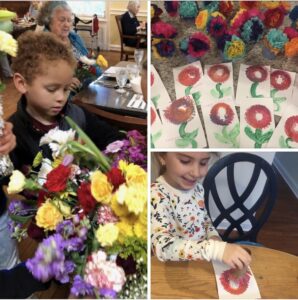
At WCFS, we treasure our many opportunities for service! On May Day, we traditionally take flowers from our yards and gardens to our friends at The Hickman Friends Senior Community of West Chester next door. While we can’t be there in person this year, our students, their teachers and their families are making sure there are still cards and beautiful flowers (thanks, Teacher Romana!), sent with love.
“Creating an Anxiety Toolbox,” from WCFS School Psychologist John Scardina

Creating an Anxiety Toolbox in Uncertain Times from WCFS School Psychologist John Scardina (four minute read)
We certainly need tools right now to deal with our national health emergency. Anxiety is a natural reaction to uncertainty about the future, and uncertainty has become a fixture in our daily lives.
Here is a cognitive model of anxiety:
Anxiety = Risk/Resources
This has great appeal for me: we can reduce risk, but we can also increase ourresources to reduce our anxiety. As we are moving forward, here are our challenges:
● How do we accurately assess risk? Let’s use clear medical evidence rather than social media posts. Let’s each be well-informed and follow the guidelines provided by organizations like the Centers for Disease Control and the World Health Organization. Let’s also be clear with our children that we are doing what is necessary to be safe and healthy. Children can handle risk when they see usdoing the best we can to acknowledge our fears, learn all we can from the best sources to handle the situation, and apply our knowledge to our family life with confidence and love.
● How do we increase our resources – as individuals, as family members,as local community members, and as citizens of the world?
Here are some simple ideas to develop our resources:
● As individuals we can take time each day to check in with our own gratitude list: what are five things I am grateful in my life right now? Gratitude reinforces our own inner resources. Stay focused on what is right in your life.
● As families we can share our gratitude lists and also take advantage of this time we are home together. Let’s return to family rituals that have sustained families for time immemorial: shared meals, reading aloud together, time spent in nature shared responsibility for meal preparation, engaging in artistic endeavors, prayer and spiritual practices like grace before meals, shared readings from the books of our faith, and recognition of that of God in one another.
● Our communities include many individuals with many more needs that we are dealing with ourselves. Let’s check in with our neighbors and see how we can share our riches and strengths. Families that engage in service to others grow in resilience and unity. Be safe but be present as much as is possible in your community: Humans can maintain social distance and still promote connectedness. Make a call, send a text, write a note, bake a cake – stay connected.
● Our global community is in turmoil. Let’s realize that nationalism does not promote well-being for all. I am reminded of the bumper sticker that states, “God bless the whole world – no exceptions.” As we celebrate our own family heritage and our diverse communities with people from around the world, let’s rememberthat when we are face-to-face with one another we realize that we are all one species.
We are certainly experiencing a “new normal” as we deal with this pandemic. Anxiety can be managed by reducing risk and increasing resources. When we look back on these days, will we focus on the fears that we felt, or will we celebrate the ways in which we grew as individuals, families, and communities in spite of our fears?
Jump and Learn
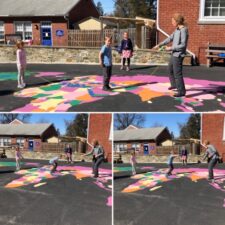
Cooperation, collaboration…a beautiful day for learning to turn the rope and time the jump!
Why Do Quaker Schools Matter
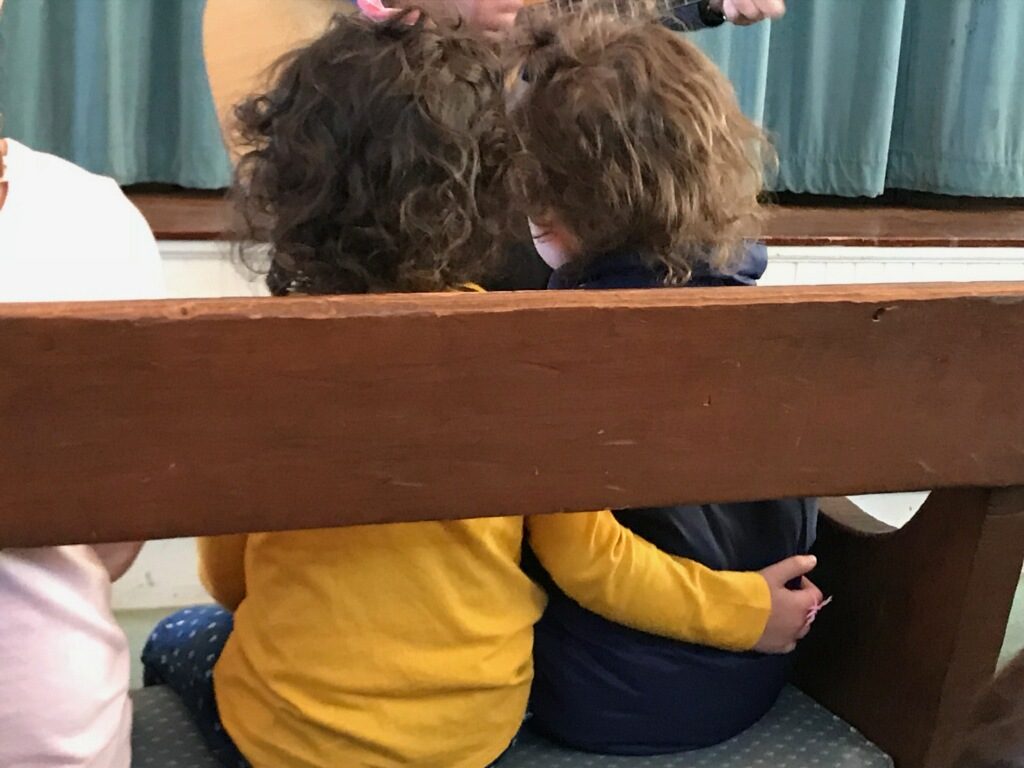
Why Do Quaker Schools Matter? from Head of School Brian Fahey
I was at a meeting not too long ago and I was talking to someone who said that not all Quakers believed that we should have Quaker schools. I think that they expected to catch me off guard, but I told them that there was any number of issues on which Quakers did not agree, but that at least we had gotten good at the way that we disagree. Then they asked, “Well, why should we have Quaker schools?” I think that they were talking about what we call our “Value Proposition” and that they wanted me to talk about our curriculum and our test scores, but I said that Quaker schools are important because we are trying to create a better society, that we start with the heart and that teaching is an act of love. Good teaching has to be an act of love, and that’s because children figure out very early in life that adults can influence them, or control them, with power and authority. While children, most of the time, will submit to power and authority, they are not impressed by it at all, and it does not touch them or move them in a deep way. What moves them is love. If a teacher’s interactions with a child come from love, instead of strictly from power, the effects on the child and the teacher are sometimes magical and transformative. We see it all of the time. When children know that our expectations are coming from love, rather than from the desire of adults to manage them, we create possibilities and openings that might not be apparent to us, which is another way of saying continuing revelation.
Continuing Revelation Continuing revelation is the foundation of our work. We know that it isn’t brought about by contemplating what we already know to be true. Revelation comes about when we allow that we don’t know all of the answers and when we create a space for mystery and possibility. With children, that means that we consider what we don’t know about a student to be just as important, or more important in some cases, as what we do know about them. If we contemplate the talent, insight, or curiosity that lives within a child and then consider how we might help them make those gifts apparent to the rest of our community, rather than defining the child based on what we already know about them, then we create the possibility of continuing revelation. If we only consider what we already know, we limit our understanding and theirs. I think of it as nurturing a mystery and being optimistic about the outcome. Waiting for revelation is the spiritual part of teaching, from one heart to another.
Radical Empathy In a larger context, this is important because as the writer Isabel Wilkerson has said if we are going to create a better society, the heart is the last frontier because we have tried so many other things. We have laws against discrimination and violence, we know about the persistence of poverty and struggle in our country, yet all of these things persist. Wilkerson says that they persist because we have not changed our hearts. We have power and authority, those things are clearly established, but we don’t seem to recognize our common humanity. She says that what is called for is radical empathy, the sincere and dogged effort to understand another person’s reality and to understand the experiences that have shaped that reality.
In Quaker schools, we expect children to practice radical empathy. We insist on conflict resolution, restorative justice, and building and repairing relationships. This goes on in large and small ways all of the time at West Chester Friends School.
Just last week a student showed up in my office due to some chronic misbehavior. Right from the start, it went badly. He was not very responsive to my questions and the longer this went on, the less I seemed to care about what was going on with him. I suggested that we sit in silence for a while to see if that might help, sort of like a small meeting for worship. After about five minutes I told him that all I was feeling was resistance, from him and from me, so we agreed to come back and talk about it the next day. He was waiting for me first thing in the morning and we talked for a while and I learned some things that I didn’t know about him, and some other things that he was worried and anxious about. I told him that it took me a while to realize it, but I was upset because I was worried about him and that he wasn’t giving me the chance to understand what was happening, so I wasn’t able to help him. I said that since we weren’t really communicating, the only thing I felt the day before was the desire to punish him. In that scenario, we both would have missed the chance to understand each other. And then we talked about how he might repair the relationship with his teacher. It was a true heart-to-heart, where we both came away feeling better understood by the other. It’s interactions like those that will help children learn how to practice empathy and how to love others, and to help us create a better society. A just society and a better world can’t be achieved just by passing laws. It has to be done, as Isabel Wilkerson says, one heart at a time. And that is why we need Quaker schools.
